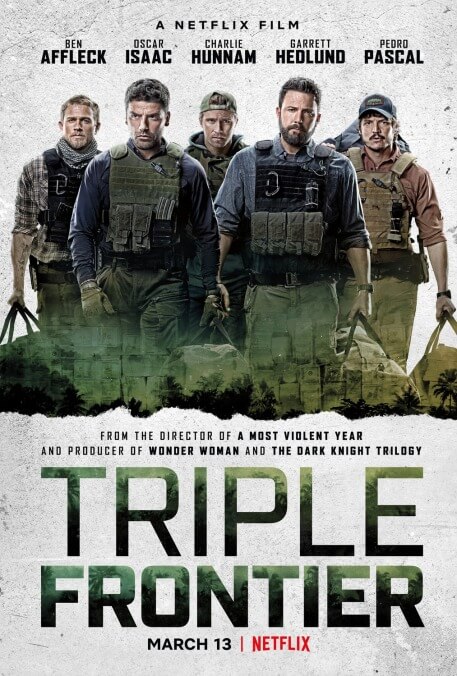Exactly 50 years ago, the U.S. Federal Reserve, which had previously issued bills with values as high as $10,000, made it all about the Benjamins. Every bill more valuable than $100 was officially discontinued. (They’d stopped being printed decades earlier, but many had kept circulating.) One of the stated reasons for doing so was to make U.S. currency less attractive to criminals—it’s harder to move or hide, say, $10 million in cash when that amount constitutes 100 times as many bills as it once had. Movies and TV were relatively slow to reflect this shift, continuing to pretend for many years that the contents of a single briefcase could purchase a small country. Lately, though, filmmakers have made some sincere efforts to be realistic about the sheer bulk of pilfered loot, and Triple Frontier—in which five retired Green Berets attempt to rob a South American drug lord—takes those practical difficulties to a new level. It’s basically a contemporary gloss on The Treasure Of The Sierra Madre, except that these “prospectors,” while similarly undone by greed, succumb not to each other’s paranoid violence but to the good old law of gravity.
As it happens, the duo that made Triple Frontier boasts an impressive pedigree in cinematic arduousness. Mark Boal, the journalist whose script for Zero Dark Thirty detailed every step of the lengthy quest to find Osama bin Laden, conceived this film’s story, and shares screenplay credit with director J.C. Chandor, who once made an entire movie about an elderly man stranded alone in the middle of the ocean. Initially, however, it looks as if Boal and Chandor are striving for more commercial accessibility this time around. The film’s first half employs the standard “one last job” template, as frustrated Special Forces operative Santiago “Pope” Garcia (Oscar Isaac) assembles a group of his old buddies, including expert strategist “Redfly” (Ben Affleck), brooding muscle “Ironhead” (Charlie Hunnam), ace pilot “Catfish” (Pedro Pascal), and Ironhead’s younger brother, Ben (Garrett Hedlund), who’s apparently so cool that he doesn’t need a nickname. Their target: a drug kingpin who reportedly keeps millions of dollars in his fortress of a compound. Pope has been working for years to nab this baddie, and sincerely wants to stop his reign of terror, but he also feels that he and the other men, who are all struggling financially, deserve a sizable reward for their service to the United States. Consequently, this operation occurs entirely off the books.
So far, so meh. Triple Frontier doesn’t overdose on macho military posturing, which is a welcome change of pace. Trouble is, neither does it offer anything terribly compelling in lieu of testosterone-fueled badinage. None of the five ex-Berets makes much of an impression—Affleck, playing a slightly doughy sad sack who metamorphoses from the group’s most reluctant, cautious member to its most crazed, comes closest to delivering a performance that isn’t purely functional—and every beat of planning and executing the heist feels so familiar that there’s scarcely any real tension. Early on, the film even blunders into outright hackwork, employing laughably literal-minded needle drops. Given the thorny intelligence of Chandor’s previous films (which also include Margin Call and A Most Violent Year), it’s hard to believe that he thought it was a good idea to play Fleetwood Mac’s “The Chain” over a sequence of Pope telling the others that he can’t do this job without them, or to accompany shots of the men running through the jungle with Creedence Clearwater Revival’s “Run Through The Jungle.” (Okay, they’re stealthily walking. But still.)
Once our anti-heroes successfully infiltrate the drug lord’s compound, however, events take a gratifyingly pragmatic turn. There’s more money than they’d expected. A lot more. About $250 million in cash, they eventually estimate, secreted in just about every wall of the building, floor to ceiling. Rather than leave millions of dollars behind, they alter their carefully timed plan, which in turn requires taking certain actions that they’d fervently hoped to avoid. And when that nightmare gets resolved, there remains the pesky matter of physically transporting more than a hundred (!) large duffel bags out of the country, via a helicopter that Catfish isn’t confident can handle that much weight. Triple Frontier (which could use a better title—this one apparently refers to the border area where the action takes place, but that’s barely relevant) becomes a fascinating sustained exercise in absurdist triage, as one mishap after another forces the men to decide whether they’re prepared to throw away obscene amounts of money in order to save their skins. By the time they’re keeping themselves warm at night in the mountains by burning roughly three kids’ Ivy League tuitions (for four years each), in part just because that’s one less bag they’ll have to lug/drag across hell and back, crime’s proverbial failure to pay has taken on a maddening new meaning.






![Rob Reiner's son booked for murder amid homicide investigation [Updated]](https://img.pastemagazine.com/wp-content/avuploads/2025/12/15131025/MixCollage-15-Dec-2025-01-10-PM-9121.jpg)

























![HBO teases new Euphoria, Larry David, and much more in 2026 sizzle reel [Updated]](https://img.pastemagazine.com/wp-content/avuploads/2025/12/12100344/MixCollage-12-Dec-2025-09-56-AM-9137.jpg)








